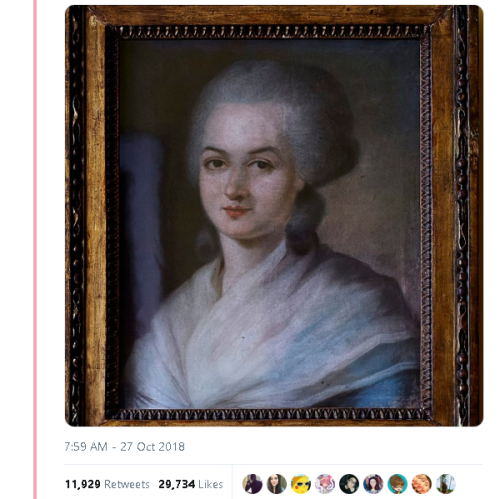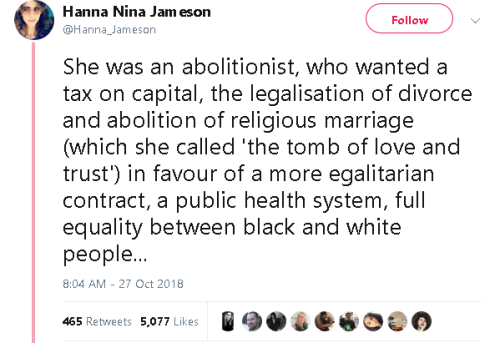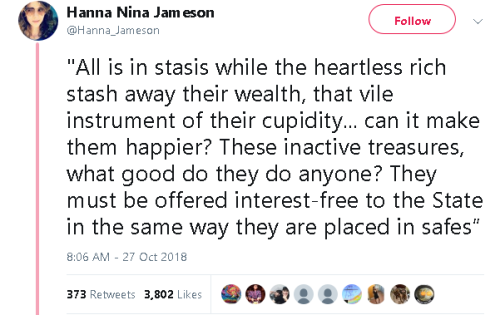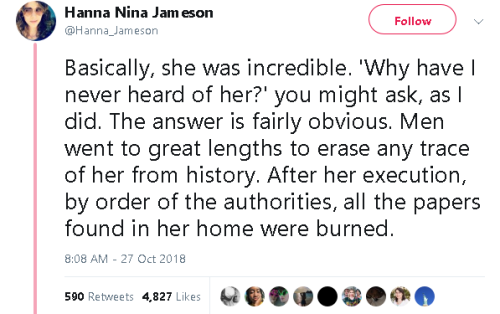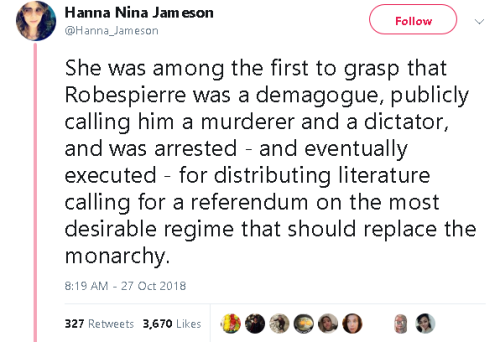prudencepaccard:lacommunarde:vampireinvitations:lacommunarde:gahdamnpunk:An absolute badassLiterally
prudencepaccard:lacommunarde:vampireinvitations:lacommunarde:gahdamnpunk:An absolute badassLiterally no though?A) she was guillotined because she was a royalist. You know Mme. Roland and the Girondins? They were less royalist than Olympe de Gouges, and they at least called for the king to be exiled. Olympe de Gouges tried calling for reinstatement.B) Robespierre wasn’t a demogogue. Several people then were. Marat certainly was. Danton was. Herbert fashioned himself to be. But not Robespierre. He was the speaker for the Committee of Public Safety (which held dictatorship, but was a twelve person Committee on which Carnot, Collot d'Herbois, Billaud-Varennes, Herault de Seychelles, etc all were key people as well as Robepierre, Saint-Just and Couthon), and tended to believe that the will of the majority was the best way to estimate the will of the people.C) As to why you haven’t heard of her, I don’t know. Your French Revolution class sucked? Ours wouldn’t shut up about her - and Lynn Hunt, a revisionist historian but one of the better ones except in this regard, did a whole huge essay on her - and neglected to mention any actually republicaines such as Pauline Léon and Théroigne de Méricourt, or even the Women’s March on Versailles and how many women supported the Enrages who supported affordable, nutritious bread and proto-indexing the price of bread to what poor families could actually afford. and i’d like to add @lydia-gastrell‘s commentary here, which is also important:“I’ve said it before, and I’ll say it again. The French revolution was not a grassroots uprising of the starving. It was long-game rage from the wealthy middle class who were pissed off that they had all the money (most were far wealthier than titled aristocrats) and still none of the privileges. They couldn’t stand that their wealth didn’t buy them entree into the aristocracy, so they spent a good 10 years using the very real oppression and strife of the lower class to bring down the top so they could replace it with themselves. People like Robespierre and his fellows didn’t give two shits about the starving hoards beyond how he could use their anger and pain to raise himself. All they wanted was to take down the aristocracy so it would no longer be hereditary. They wanted a world where you could “work up” (i.e. be rich enough) to gain power, and any social advances beyond that, they furiously suppressed.”@vampireinvitations @lydia-gastrell Well now! That’s certainly the first time I’ve seen Robespierre “The Incorruptable” accused of not giving a shit! Let me (hopefully politely), take apart your argument, because this is something I’m really passionate about. And if you picked basically any other revolution, I would agree with you. But the French one, alas, they did all believe in making the world a better place and bring up the poor of France and that everything would then be a Rousseau-ist paradise.Cool. So, while this could be argued for the early revolution and those right of the Girondins, by the time the National Assembly (rather than the National Constituent Assembly, i.e. the Assembly members trying to write a Constitution), and I will even say from the night of Aug 4, 1789 when the nobles gave up their privileges to prevent the Great Fear from getting worse and burning all their chateaux, in what historians can only describe as a game of oneupsmanship where the aristocrats abolished basically all their Ancien Regime privileges, it had very quickly ceased to be merely trying to open up the doors to privilege and started being a question about how society worked and how society can be best arranged to make it so no one was suffering and everyone could realize the benefits of society. Additionally, while it could be said of people like Danton, who was rather well-off both before and during the Revolution, of Robespierre, who could barely afford his room at a boarding house and keeping his siblings (while everyone loved Bon-Bon Robespierre, no one could say he spent lightly) and therefore took up the Duplays’ offer to come live in their spare room; Saint-Just, who had to share a floor in a boarding house with Billaud-Varenne and Collot d’Herbois, whom he said were terrible neighbors; and people like Marat, Fouche, Romme, and Babeuf and Buonarroti were certainly not wealthy.One of the arguments between the Indulgents and the rest of the Mountain (Robespierristes and Enrages) could be seen as whether they placed more emphasis on whether people could get there by civil and political rights alone or whether there also needed to be economic rights and protections as well. Indulgents/Dantonists tended to think people could get there by civil and political rights alone, Robespierristes thought both and many Enrages tended to think economic and social rights and protections and even socialist equality (the Babeuvist and Buonarroti Conspiracy of Equals was out of the Enrage branch,though they themselves would have said they agreed with Robespierre).Now, onto the actual policies the Revolutionaries (sought to) introduce:Voting rights and citizenship for actors and Jews (December 1789): because Europe in the Middle Ages and Renaissance was horrifically antisemitic, Jews on the eve of the revolution were still viewed as tolerated (barely) until some issue came up (typically people getting angry at being overtaxed by the king, and then all the Jews would be blamed and either told exile or convert or convert or die depending on which time it was). And Jews were certainly not viewed as fellow countrymen. When subject turned to citizen, and it became necessary to determine who could vote and hold office and be counted a citizen, Robespierre proposed the Jews should be included in the definition.Whether there should be a minimum wealth to vote (January 1790) and run for office: Robespierre also proposed - as did rather a lot of others - that there should be no minimum wealth necessary to vote. Minimum wealth necessary to hold office was another matter, as some offices didn’t pay and worked you too long for you to hold another job. Emancipation of people of color in Haiti (1794): Robespierre also proposed and it passed, that the slaves of Haitian slaveholders should be set free and that the now free people of color should be made citizens and able to vote. This passed. Education: this is actually a rather interesting area of study. They moved the schools from being church-run to state-run and with no school fees, so everyone’s kids could be educated in 1791. Early on, they started teaching kids how to read the Declaration of the Rights of Man and the Citizen of 1789 in their local language dialect. Later on however, in was deemed that to increase a sense of being French rather than a sense of being says Lyonnais or Vendeen or Provincial, there should be a standard language policy across France and kids were then taught to read in Parisian French (and taught the Declaration of the Rights of Man and the Citizen of An I/1793). General maximum: this was the maximum price grain could be sold at so the city of Paris could have the prices of bread be less expensive. Unfortunately, it had the effect of people hoarding grain, waiting for the general maximum to be removed but if people did not hoard, it would have satisfied both the bakers and the people.Equality bread: I could go on at length with what a novel idea this was at the time. And it was Fouche who implemented it first, but his methods of introducing it were found to be a little overenthusiastic and so Romme came up with a better way of introducing it, such that some villages were found to still be using it more than a century later. Basically, a number of poor people had been eating bread made of anyhing but wheat, including a lot that has calories but no other nutrituous value - rye and bran were major in poor bread, but also sawdust, etc - while the rich not only had wheat bread but also meat and fruit. So equality bread proposed that everyone gather their bread-making flours in a central place, and it would then be mixed together and apportioned according to what they brought in. Plus, there would be some left there just in case there was a bad harvest, so people who had to use their whole saving in planting would have something to at and something to plant the following year. Military training: Pre-Revolution enlisting in the military was something only aristocrats could do and then something typically second or third sons would do. This requirement was abolished with the cahiers d’oleances even before the Night of Aug 4th. Then came the French Revolutionary Wars and with them the levee en masse, or the first general draft of the modern era, and everyone who was drafted was given a gun (originally a pike, but very quickly became a gun when the Convention realized giving pikes instead of guns and trusting to the enthusiasm of the republic was not their best idea). This was very different from what other countries were doing - Britain, for instance, considered it then decided in would rather lose than arm its own subjects in such a way. And then were given shoes, when it was realized that not everyone had them, requisitioned at a new factory (I remember reading that the factory owner tried to ask for payment for the shoes and was told by the Committee of Public Safety that what else was he doing to help the war efforts, and if it was truly a hardship, they would pay him the same food, and veterans benefits as everyone else was getting).The also implemented food rations for anyone away in the army and their families, enough to make sure they could eat their fill and not starve. Many a starving peasant signed up for just this reason, so that his wife and kids could be fed. Also, and this only started to be implemented in the last few months or so of the Revolution, but veterans benefits for if someone died, their family would continue being supported.And this wasn’t even all they tried and did to improve the lives of the poor. Other things include monetary policy with the assignat, which turned out to be much more complicated than they originally thought it would be, but that is to be expected with fiat currency; the beginnings of the first public healthcare system, where if you couldn’t afford a doctor you could go to a certain hospital and they would try to make you better at no cost, and a few others.Long post short. The French Revolutionaries did actually care and try to improve the lives of the poor.BibliographyGross, Jean-Pierre. Fair Shares for All: Jacobin Egalitarianism in Practice. Cambridge University Press, January 28, 1997.
Tumblr Blog : gahdamnpunk.tumblr.com
#history#french revolution

